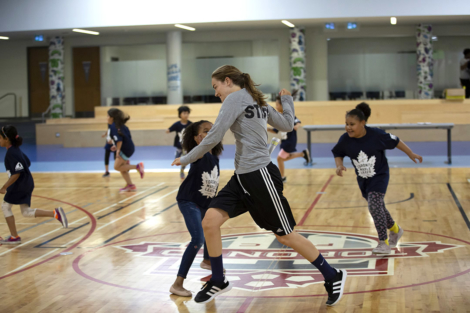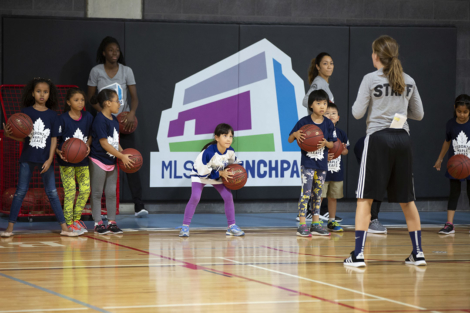It’s been four years since Vanessa Wallace last suited up for the Varsity Blues women’s basketball team, for a game she never anticipated would be her last.
Wallace, a role player and sharp shooter for the Blues, scored a single three-pointer during three minutes of action in the final home game of Toronto’s 2014–2015 season, which would result in a loss against the Queen’s Gaels.
Wallace didn’t see any action in the Blues’ opening round playoff victory over the Brock Badgers, nor did she play when the team bowed out of the competition following a 15-point loss to the Windsor Lancers.
The following season, Wallace was cut from the team.
The entire experience has been an invaluable lesson, but one she never expected to have to go through. Wallace admits that she failed to meet the expectations that she’d had for herself in basketball when she first entered U of T.
She started playing in a recreational basketball league when she was nine years old, but basketball was “nothing serious” until she made a club team in Grade Six. As a first-year student unsure of what to major in, the sport was the only thing she knew she wanted to do at university. The Ottawa native admits that she placed more emphasis on where she wanted to play than on where she wanted to live when choosing a university.
Wallace graduated from U of T in August 2017 with a degree in English and a double minor in history and anthropology. She still plays the sport that she loves, but in an arguably more meaningful way. She teaches a blend of basketball and life skills to underprivileged youth at her job with the Maple Leaf Sports Entertainment (MLSE) LaunchPad, an organization seeking to “explore and measure how sport can help improve the lives of youth.”
The Varsity sat down with Wallace to discuss her current role with MLSE, her time with the Blues, and the women who inspired her growing up.
The Varsity: How did you make the transition into the workplace after graduation?
Vanessa Wallace: I only played my first three years of undergrad, and so [during] my last two years, I was in school but I was also not loving school. It was really important to find out what was out there workwise and be able to build up my résumé that way, because English is not necessarily something that lends to one specific industry. I knew I loved basketball, being involved, so it took a lot of creativity, and I really took to volunteering.
TV: Can you describe your experiences volunteering?
VW: I was trying to create an internship for myself and go do all these different placements. You Can Play has been the organization that I’ve been involved with since 2016 and that’s been really awesome. It’s an organization that advocates for LGBTQ+ inclusion in sport. I get to work with youth, go into high schools, and run workshops about how to identify casual homophobia in sport. I’ve worked with kids for a really long time, so that was great to marry that with sports advocacy.
TV: What’s working with kids like?
VW: It’s really fun, for starters. Kids are so fun and I love getting to share that experience with them. Living in a city like Toronto, being in U of T, you kind of forget that there’s information that you kind of just take for granted, that isn’t something you automatically knew. Somebody taught you that and at some point you have to be the person who teaches it to somebody else. So getting that opportunity has been an honour.
TV: Can you describe your role working for MLSE?
VW: I’m a sport program lead, basketball specifically at MLSE Launchpad. Youth can participate in basketball, soccer, volleyball, ball hockey, there’s a rock climbing wall… The program isn’t sport for performance, it’s really sport for development. There’s a life skills component that we teach. This month, the life skill of focus is social competency and the last program cycle it was self-regulation. The outcome that’s hoped for is sports [being] the hook that brings youth in, but when they leave they have all of these life skills that will take them much further than layups, footwork, and physical fitness.
I knew I had basketball knowledge, but I didn’t know how that would translate into a coaching role. Being able to write up the program, convey it to supporting staff, and see it go start to finish was a huge growth point for me. Having confidence in the program I was writing [and] how I wanted it to be delivered, that’s been a really big turning point in the last few months. I felt really solid about that and initially I wasn’t.
TV: Would you say that your experience with the Blues really helped you hone those skills?
VW: I definitely have had some great coaches to look up to on the Blues [team] and not until I started coaching did I realize that — I was doing things similarly to how they would. So you don’t even know how much you’re getting from that person until a while after, how much you’re emulating the things that they do… As an athlete something that I found really difficult is you really have one main focus and that’s your performance. It’s cool now to reflect on how much you’ve learned from everyone — teammates, seniors, and captains. You don’t recognize that until you’ve moved on.
TV: What was your experience like playing for the Blues?
VW: Michelle [Belanger] is a fantastic coach, she eats, sleeps, and breathes basketball. What I learned from her in the short time that I was on the team was just the tip of the iceberg.
Overall, I’d say my time on the team was some of the most challenging years of my life. I dealt with some mental health issues and then the pressure of being a Varsity athlete on top of that my experience wasn’t going as planned. I had such high expectations for how I would perform and how it would feel. Although I did make really great friends and got to travel and play basketball, which is what I love, I didn’t really have any self-worth because I wasn’t performing well. After my third season, I was cut and that was really tough.
I didn’t have any direction, and that’s when I started applying to all these different jobs and learning what was out there beyond playing, which is kind of how I forged my path. [Eventually], I realized that all of these hard lessons that Michelle and sport taught me… even though the experience didn’t go as planned, I learned so much from [them] and I’m so grateful for it.
TV: Do bonds between Blues teammates really last forever?
VW: Yes, definitely. I was just visiting a teammate who’s since moved to the States and it was awesome. We didn’t even make any plans. The idea was [that] we were just going to hang out and spend time together. The funny thing is, you spend everyday with them, practice, a nutrition session, individual practice, weight session — that could all be in one day. Maybe you have classes with them, maybe they’re also your roommate, and then you spend months apart but when you see them again, it’s like no time has passed.
TV: How important is growth for women’s sports?
VW: It’s definitely really important to me. It wasn’t until I started working with girls and seeing what I experienced growing up, [what] they are continuing to experience as well, [only then] did I realize how great of an impact that they actually had on me.
Not getting the same amount of gym time, women’s basketball shoes aren’t really a thing — you just get men’s shoes, you lace them up as tight as possible, and, you know, different social norms.
I see that there’s still similar hurdles that I and teammates of mine have faced, but there is more awareness and more organizations, like Canadian Association for the Advancement of Women in Sport [and] Fast and Female.
TV: Which female athletes inspired you growing up?
VW: I wasn’t big into watching professional sports on TV, but I was really lucky I had so many female role models in the basketball community that I could look up to. At U of T, there were some girls that came in and Michelle was the first female coach that they’d ever played for… To me, that was shocking because Ottawa is a big basketball town. Every weekend, I was either at a Carleton game or a UOttawa game, so a lot of those players at Carleton and Ottawa U, I really looked up to and then my own seniors that I would play with.
There were three seniors when I was in Grade 11 that I really looked up to. They were on a rep team I played for; it was Kellie Ring, Rashida Timbilla, and Kim Pierre-Louis. At U of T, I got to play with Jill Stratton, who is, I think, still the program’s leading scorer and that was amazing, but also playing with Rachel Sider, Liane Bailey, [and] Jasmine Lewin.
TV: Where do you envision yourself in the future?
VW: I’m learning. I still feel like I’m in the position where I’m learning more than I’m giving back. I have that foundation of basketball knowledge and experience playing, but in really understanding how the game can impact more marginalized communities, I feel like I’m a rookie.
It’s hard to see… myself in five years because there’s so much more information that I want [to learn].
I’m finding as many opportunities to be kind of a student of the world, whether that’s [through] a program that benefits girls or whether that is a program that helps with poverty reduction or violence against women, I’m just pursuing all of those opportunities right now.
This interview has been edited for length and clarity.




